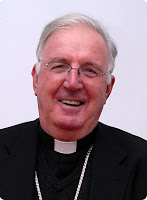Cardinal Cormac on Unity and Mission
The Spectator magazine sponsors a series of debates in England. One occurred on Tuesday 2 March. The topic, as provocative as ever, was “"England Should Be a Catholic Country Again".
Cardinal Cormac Murphy O’Connor (left), the retired Archbishop of Westminster, was lined up to speak for the motion. Leading the speakers against the motion was Lord Richard Harries, the former Bishop of Oxford. The irenic words of the Cardinal deserve our attention. He and I worked closely together when he was the Roman Catholic Co-Chairman and I was the Anglican Co-Secretary of ARCIC, so his ecumenical vision is no surprise, but it is still very encouraging.
The Cardinal said:
Cardinal Cormac Murphy O’Connor (left), the retired Archbishop of Westminster, was lined up to speak for the motion. Leading the speakers against the motion was Lord Richard Harries, the former Bishop of Oxford. The irenic words of the Cardinal deserve our attention. He and I worked closely together when he was the Roman Catholic Co-Chairman and I was the Anglican Co-Secretary of ARCIC, so his ecumenical vision is no surprise, but it is still very encouraging.
The Cardinal said:
“In speaking of a Catholic Country, let us agree that the Reformation conflict is over. We do not need to trade history. And I for one would be the first to be grateful for so much that the Anglican Church and other Christian Churches have brought to this country that has been of such benefit over the past four hundred years.Cardinal Cormac went on to say what a united and strong Church in England would do:
Instead, let me give you a better starting point for our debate. Go back to the visit of Pope John Paul II in 1982. For many, the key image was the Pope and the Archbishop of Canterbury, kneeling before the shrine of St Thomas a Becket, side by side in prayer. It was extraordinarily moving. Our two churches have already come a long way on the path back to the unity which Christ called for. And it will take more than even The Spectator to push us apart again. I am a convinced and dedicated ecumenist and I believe that the ecumenical movement is like a road with no exit. We are not in competition but in a shared endeavour. It is not a choice between the Church of England or Catholic England: it is a choice for the Church in England”.
“This English Church would speak to the nation of true belief, of the dignity of the human person from the beginning of life to its natural end. It would preach a Gospel of life and truth. It would speak of what the Church is for, not so much of what it is against. It would speak for the poor, for the prisoner, a voice for the voiceless. It would speak of the family, to help forge a healthy nation, and seek to defuse, as the Chief Rabbi has said, the bomb that has been put under the cement that brings life together here in our country, namely, the family. A culture that encourages sex without love, marriage without commitment, children without the stability to nurture them properly, is a culture that needs a Church in the market-place; and a voice that speaks about the place of religion in society and of God who, in Christ, shows Himself a God of forgiveness, acceptance and love”.Although refering to the English context, the Cardinal's words can be applied to a divided Church everywhere. Here is a vision both of unity and what that unity is for: the mission of the Church.




Comments
Post a Comment